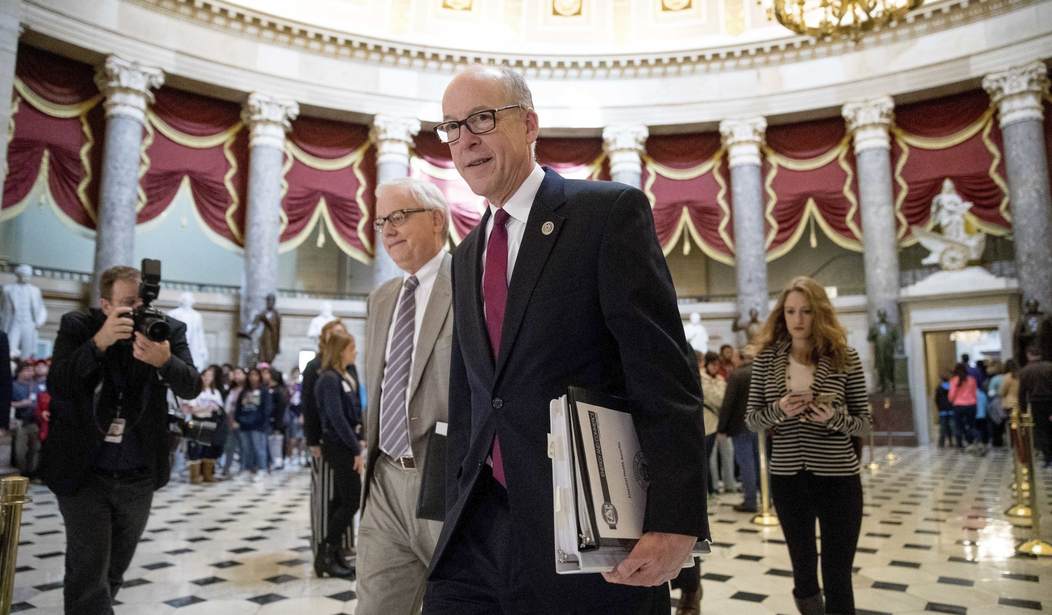WASHINGTON – House Energy and Commerce Committee Chairman Greg Walden (R-Ore.) told PJM that many Democrats such as Senate Majority Leader Chuck Schumer (D-N.Y.) are “hypocritical” for opposing efforts to change Obamacare’s requirement for insurance plans to cover “essential health benefits” after they supported the PACE Act in the last session of Congress.
In October 2015, President Obama signed the Protecting Affordable Coverage for Employees (PACE) Act into law, which changed the definition of a small employer under the Affordable Care Act so that they would not have to purchase insurance plans that cover all essential benefits required under Obamacare. Walden said Democrats previously recognized that the essential benefits rule was “destroying” that market.
He questioned why Democrats would oppose doing the same thing now for the individual market under Obamacare, which they had supported for small businesses in the past.
Some Democrats have argued that Republicans are wrong for opposing the minimum essential benefits requirement in Obamacare because repealing it would take away, for example, substance abuse and maternity coverage, which they think every health plan should be required to cover.
PJM asked Walden how he responds to Democrats’ argument.
“It’s pretty simple – if you were in the Congress, in the last Congress, you voted for it already because the Guthrie bill did precisely that for the 51- to 100-employee market. We repealed the essential-benefits mandate in that market because they recognized it was destroying that market,” Walden said during an interview on Capitol Hill.
“So it’s pretty hypocritical since they voted for it unanimously in the House and Senate in the last Congress to now say somehow it’s an evil thing. By the way, the same mandates do not exist in the large group market, where 155 million Americans get their insurance. There’s no essential mandate requirement in the 51 to 100 group market – it’s only in the individual market, maybe some others but the individual market, certainly, and that’s the one that’s imploding.”
Walden mentioned a conversation he had with Oregon Gov. Kate Brown (D) about changing Obamacare so that states could set up a health insurance market that works for them instead of being required to meet specific federal rules and standards. Walden said the American Health Care Act, which House Speaker Paul Ryan (R-Wis.) pulled from consideration but could be revived in the future, would give states more flexibility to design their own system compared to Obamacare.
“I talked to my governor, who was fiercely opposed to the legislation we were doing, but I said, so in Oregon are you telling me you wouldn’t just go ahead and incorporate those into the state statute, if they are not already there, which they probably are? She said, ‘No, we would do that.’ I said, ‘OK, so it wouldn’t be an issue, would it?’” Walden recalled.
“States get the right – that’s all we’re doing is giving you the authority to set a market that will work in Oregon and she would keep these things in place, so that’s all we were doing was transferring authority and control back to our states and communities. But for Democrats to argue, as they did, the repeal of the essential benefits in the individual market was some credible disaster, then they are indicting their votes from two years ago where they did precisely the same thing and Chuck Schumer was a co-sponsor of the bill,” he added.
Despite the failure to gain enough support from the House Freedom Caucus for AHCA, Walden said the GOP is still motivated to prevent Obamacare disaster.
“Clearly the market hasn’t improved, problems remain. Our desire to intercede and prevent collapse of the individual market is strong; we’ll see if we can figure out a common path to get there,” Walden said.
“It would be nice if we did healthcare in a bipartisan way. I understood from the beginning that it was unlikely for any Democrats to vote to repeal much or any of Obamacare – it’s not in their DNA to do that, and I understood that going in on this piece. But there’s so much more on healthcare,” he added.
Walden pointed out that Democrats and Republicans are working together on other healthcare-related issues outside of Obamacare.
“I think you’ll see we do work in a bipartisan way – the reauthorization of Food and Drug Administration programs, community health center reauthorization, CHIP reauthorization – all of which are really important healthcare programs, but on this one it’s pretty polarized, right, I mean there’s no arguing that,” he said. “So I don’t know, I would hope we could pick ourselves up, dust ourselves off and continue to find common ground with whoever wants to work with us.”
Walden was asked if there’s something he thinks both parties could agree on to help stabilize the individual market.
“I would argue that we had components in the legislation passed out of our committee that would certainly help in bringing stability that was to be coupled with areas of the law that Secretary Price can affect. And the two together worked pretty well, not to solve every problem – there’s much more that needs to be done – that was all, sort of, the third phase to this. You can’t do it all in one bill at one time, especially with reconciliation,” he said.
“So we’re continuing to try and find a solution, which is what I’ve always been about as a legislator – trying to pull people together and solve problems. This problem is just really hard to solve – a lot of dynamics,” he added.
Rep. Barry Loudermilk (R-Ga.) told PJM that House Republicans should deal with replacing Obamacare first before moving to tackle tax reform.
“This is what people are missing about what’s going on here, because for two years we fought for a bottom-up process. If you go back and think, if this bill two years ago, three years ago, would have been brought up and the final bill would have looked almost exactly like the bill that was introduced because it would have already been ramrodded through, I mean, it would have been pushed through – behind closed doors it would have been developed – that was the final bill. We fought for a bottom-up process. Paul Ryan has wanted a bottom-up process, which is basically the process the founders put in place,” he said.
“When this bill was brought out, it was made clear that this was not the final product. Now, I think some people who have been here for a while didn’t understand that, they were thinking it is still politics as usual and they immediately came out and fought the bill, not thinking,” he added.
“What my dad taught me, he’s a World War II veteran, he was in the Battle of the Bulge and D-Day, if anybody had a right to complain he did because he saw the worst of humanity, right, but we had a rule in the house: never complain, complaining accomplishes nothing. If there’s something in life you don’t like, you’ve got two choices: do something to change the situation, or just accept the status quo and go on.”
Loudermilk said he did not like the first version of the AHCA because he knew Congress could do better.
“So I set out to change it instead of just complaining about what it was – let’s make it better. But I set out a set of benchmarks and said if I get this then I will be OK with it – doesn’t mean I like it, it doesn’t mean that it’s the best bill ever, it means I can live with this and still fight to do better,” he said. “That’s the way the process worked: 250 amendments in one committee hearing that went for 27 straight hours, 60 of those amendments were taken up, and 10 of them were adopted – it put 10 amendments on this bill. It continued all the way through, in budget they took up, since they couldn’t amend it there, they took up ideas and passed resolutions for the Rules Committee to put on there.”
“We amended it in the Rules Committee – that process worked. It’s still working, it’s not over and, this is the point I’m making, we did not vote on the bill. The bill is still sitting in that hopper over there and could be called up at any moment: it’s still live, the game isn’t over, we’re just at halftime. We still have the ball so we go back out on the field and we can move forward with this thing,” he added.
Loudermilk said the House should be working on certain aspects of healthcare reform such as purchasing insurance across state lines instead of naming post offices.
“So we need to get back on track and continuing the process. As soon as we get that done then that gives us the benchmark for doing tax reform, because right now how do you do tax reform when you don’t know if this Obamacare tax is going to be law or not?” he said. “We really can’t address true tax reform until we take care of this, so I think the speaker, I know the speaker is open for us to continue on. I think the president is doing a tremendous job, but we call the shots in the legislative branch of what we pass through and I think we need to continue to do that – and I think the president is hoping that we get something done, too.”
President Trump has criticized the House Freedom Caucus for opposing the AHCA and said Democrats would come to the table to replace Obamacare when it implodes. Loudermilk was asked if he agreed with Trump’s approach to healthcare reform after the AHCA was pulled.
“I don’t know that he’s saying he wants the Democrats to come on board. He’s just saying they’re probably more willing to come on board right now, but he won’t have to do that if we get this done,” Loudermilk said.
“Here’s what I’m asking: put aside your labels, put aside your caucuses and come to the table as individuals. I don’t care if you’re Tuesday Group, Freedom Caucus, Republican Study Committee, which I’m on the leadership there. Let’s drop all these labels, let’s drop all these caucuses and come to the table individually, as individuals, and let’s get a consensus together of what we need to do – and that’s how we’re going to get it done,” he added.









Join the conversation as a VIP Member